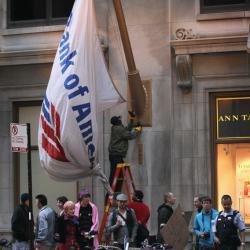It is not easy to say just what Occupy Wall Street wants; there is no concise list of specific demands. But the gist of the quickly snowballing movement is clear. Wall Street has not accepted responsibility for its role in the financial crisis and ensuing recession. It has done more harm than good for average citizens and businesses. On top of all that, average Americans are “getting nothing while the other 1 percent is getting everything. We are the 99 percent.”
One thing is inarguably true: The 99 percent don’t have 99 percent of anything, money-wise, in the United States. But just how bad is the skew toward the top 1 percent?
Let’s start with income—the money you make from things like wages, salary, interest payments, and collected rent. According to an analysis (XLS) of Internal Revenue Service data by the economists Thomas Piketty and Emmanuel Saez, the 99 percent account for 79 percent of income in 2008, with the top 1 percent taking the other 21 percent.
“That’s not that bad,” you might say. “Of course, some people are going to be richer than others.” Perhaps. But the 1 percent has been eating a bigger and bigger share of the pie over time. Back in the 1970s, the 99 percent were earning about 90 percent of income, for instance. The top 1 percent of households took a bigger share of overall income in 2007 than they did at any time since 1928.
Moreover, Piketty and Saez show that in the most recent business cycle, from 2002 until 2007, about two-thirds of all income gains went to the top 1 percent of households. The top 1 percent saw their incomes increase more than 10 percent per year, adjusted for inflation. The 99 percent saw their incomes increase a measly 1.3 percent per year. And the trend goes back further. As noted by Tim Noah in his excellent Slate series on inequality, from 1980 until 2005, the 99 percent saw just one-fifth of the overall gains in income.
The 1 percent’s income did take a knock during the Great Recession: It dropped 20 percent, whereas the 99 percent took a 7 percent hit. But that mostly was caused by the stock market crash and falling capital-gains earnings among the rich, not by salary cuts.
The 99 percent’s fortunes look even worse if you focus on wealth, rather than income—the total value of a household or individual’s assets, such their house and their investment funds. According to data compiled by economist Edward Wolff (PDF), in 2007, the 99 percent held about two-thirds of American wealth, meaning the top 1 percent has nearly one-third.
The sustained woes of the housing market may skew those numbers even further in the coming years, because the 99 percent rely on homes for a bigger proportion of their wealth than the 1 percent do. Before the crash, the middle of the income distribution had about 90 percent of their assets in their homes. Housing prices have cratered across the country. That means trillions in lost housing value and a hefty debt burden for underwater homeowners to boot.
The 1 percent has about 43 percent of all the nonhousing wealth, which has held up comparatively better. Sociologist William Domhoff reports that the 99 percent hold just 38 percent of equity in businesses, 40 percent of financial securities, and 62 percent of stocks and mutual funds. Among the 99 percent, about one in three households has more than $10,000 in stock. Among the 1 percent, nearly nine in 10 households do.
In short, inequality has increased in the past decade, leaving the 99 percent with smaller and smaller proportions of income and wealth. And it has many economists, public policy wonks, and, well, protesters very, very worried. As put by Nobel laureate Joseph Stiglitz, “growing inequality is the flip side of something else: shrinking opportunity. Whenever we diminish equality of opportunity, it means that we are not using some of our most valuable assets—our people—in the most productive way possible.”
Whether Occupy Wall Street can help to rectify that imbalance—who knows. But there is certainly value in at least making sure Americans know just how unequal the country is.
